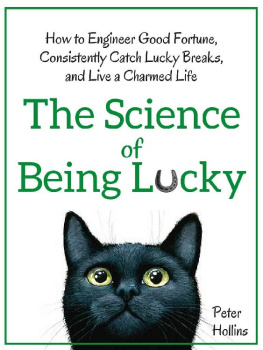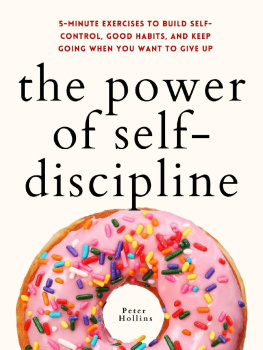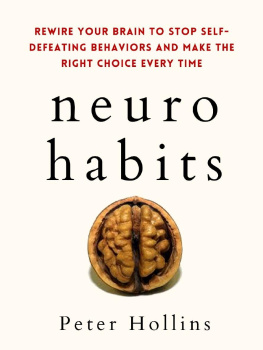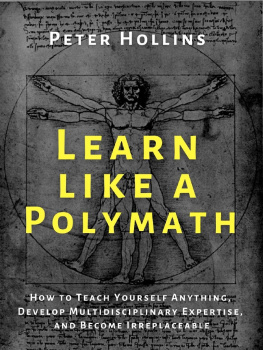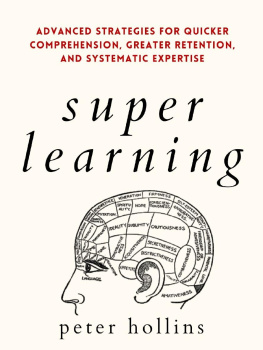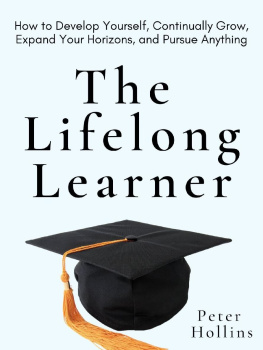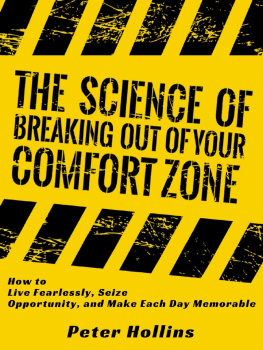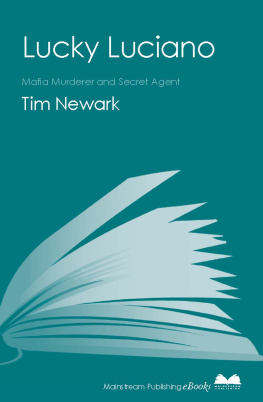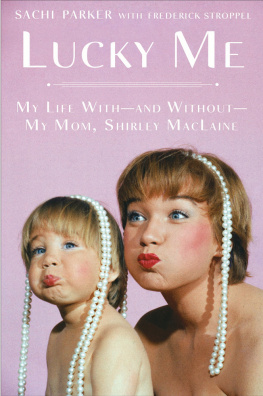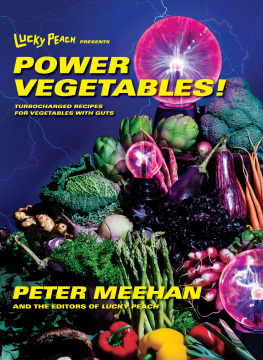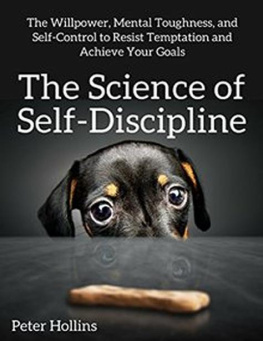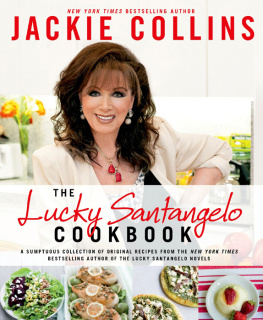Peter Hollins - The Science of Being Lucky: How to Engineer Good Fortune, Consistently Catch Lucky Breaks, and Live a Charmed Life
Here you can read online Peter Hollins - The Science of Being Lucky: How to Engineer Good Fortune, Consistently Catch Lucky Breaks, and Live a Charmed Life full text of the book (entire story) in english for free. Download pdf and epub, get meaning, cover and reviews about this ebook. year: 2017, genre: Religion. Description of the work, (preface) as well as reviews are available. Best literature library LitArk.com created for fans of good reading and offers a wide selection of genres:
Romance novel
Science fiction
Adventure
Detective
Science
History
Home and family
Prose
Art
Politics
Computer
Non-fiction
Religion
Business
Children
Humor
Choose a favorite category and find really read worthwhile books. Enjoy immersion in the world of imagination, feel the emotions of the characters or learn something new for yourself, make an fascinating discovery.
- Book:The Science of Being Lucky: How to Engineer Good Fortune, Consistently Catch Lucky Breaks, and Live a Charmed Life
- Author:
- Genre:
- Year:2017
- Rating:4 / 5
- Favourites:Add to favourites
- Your mark:
- 80
- 1
- 2
- 3
- 4
- 5
The Science of Being Lucky: How to Engineer Good Fortune, Consistently Catch Lucky Breaks, and Live a Charmed Life: summary, description and annotation
We offer to read an annotation, description, summary or preface (depends on what the author of the book "The Science of Being Lucky: How to Engineer Good Fortune, Consistently Catch Lucky Breaks, and Live a Charmed Life" wrote himself). If you haven't found the necessary information about the book — write in the comments, we will try to find it.
Peter Hollins: author's other books
Who wrote The Science of Being Lucky: How to Engineer Good Fortune, Consistently Catch Lucky Breaks, and Live a Charmed Life? Find out the surname, the name of the author of the book and a list of all author's works by series.
The Science of Being Lucky: How to Engineer Good Fortune, Consistently Catch Lucky Breaks, and Live a Charmed Life — read online for free the complete book (whole text) full work
Below is the text of the book, divided by pages. System saving the place of the last page read, allows you to conveniently read the book "The Science of Being Lucky: How to Engineer Good Fortune, Consistently Catch Lucky Breaks, and Live a Charmed Life" online for free, without having to search again every time where you left off. Put a bookmark, and you can go to the page where you finished reading at any time.
Font size:
Interval:
Bookmark:
How to Engineer Good Fortune, Consistently Catch Lucky Breaks, and Live a Charmed Life
By Peter Hollins,
Author and Researcher at petehollins.com
Click for your FREE Human Nature Cheat Sheet: 7 Surprising Psychology Studies That Will Change The Way You Think .
Table of Contents
The Science of Being Lucky : How to Engineer Good Fortune, Consistently Catch Lucky Breaks, and Live a Charmed Life
Table of Contents
I wish I could say this story happened to a friend, but alas, it happened to me.
If youve never been to Las Vegas, there are actually not that many things to do, in my opinion. Correction there are many things to do, but they all fall into a few general categories. If youre into the nightlife, the scene there is unparalleled. But if youre not, like me, then mostly what there is to do is spend too much money on extravagant activities or simply lose it gambling.
I chose to engage in the latter. This was during my third trip there, so I considered myself experienced in the nuances of gambling and superstitions. After all, I had won roughly $200 my last trip to the roulette table, so I felt like I knew what I was doing.
Now, this isnt a story about me losing a fortune. Instead, its a story about my naked lack of understanding about how some people treat the concept of good luck and attempt to bend the will of the universe to suit their needs. So there I was , back at the roulette table with my lucky penny in my pocket, when I sit down next to a man who smelled like a dirty laundry hamper, and thats putting it mildly.
He was dressed in a suit and his hair looked clean and non-greasy, so what was happening here? What odd situation did I find myself in at this roulette table? I must have made some sort of face in reaction to the smell, because the man apologetically smiled and told me that he was sorry for the smell, and that it was attributable to his lucky socks. He pulled up his pant legs and showed me a pair of ratty, beige socks riddled with holes, and which didnt appear to have any elastic left in them. The socks probably started as white, but became beige through years of wear and lack of washing.
Before placing our bets, the man sheepishly grinned and said, Last washed eight years ago. Gotta keep that luck juice!
At that moment, I suddenly knew that my good luck charms and rituals paled in comparison to what was happening in the world. I left shortly thereafter.
The Science of Luck good luck, being lucky, and avoiding bad luck examines humanitys curious tendency to want to feel included in what their life has in store for them. Think about it this way: Is it more comforting to have a steering wheel appear to change the cars direction, or have no steering wheel at all and suddenly you are headed straight at a wall? Whatever luck is, we want it on our side. It seemingly has the ability to create the life we want, or leave us in ruins. If were in the right place at the right time, perhaps well run into that one person who can make a huge difference in our career.
And so on. The possibilities are endless.
Is luck just another word for cosmic fate and we are born with it, or is it something that is manipulated by good luck charms like unwashed socks or avoiding black cats? Is there a certain way we can act in practical terms that will make us more susceptible to better outcomes, and what we might consider better luck?
Luckily, the results are in and its been proven that luck is a trait which can be engineered and manufactured. It has nothing to do with four leaf clovers or broken mirrors and everything to do with changing the way we imagine the concept of luck.
Is this book going to help you become luckier and lead what appears to be a semi-charmed life? If you mean that its going to lead you to more beneficial situations in every walk of life, then yes. After all, thats really what were after with luck, isnt it?
What is luck, and why do people want it so badly? Why do we care if black cats cross our paths, or if we are wearing our smelly yet lucky underwear while watching our favorite teams play?
We all grow up with the general idea that our actions are not the only factor at play in the outcomes of our lives that there is some amount of random chance thats either working in our favor or against it. We call this random chance luck . If were lucky , good things happen, and if were unlucky , bad things happen.
The belief in luck has manifested itself in different ways for different cultures and traditions for as long as there has been recorded history. In Western countries, theres an old saying: See a penny, pick it up, and all day long youll have good luck. In Eastern countries, many times you cant enter a restaurant without catching a glimpse of a statue of a cat waving at you.
Whatever the case, the idea of having good fortune and doing everything possible to channel this ephemeral blessing is often far more valuable to people than the coins or cats themselves. Just as accumulating good luck is highly desirable, avoiding bad luck is also of significant importance in many cultures. In fact, there are countless superstitions people hold for the sole purpose of avoiding misfortune, such as skipping the 13 th floor in high-rise buildings or not walking under ladders.
The only thing we know for sure about luck is that we want to have it on our side.
The Human Need for Control
Throughout history, we have developed an increasingly better understanding of our world and universe. Yet even now, many of the complexities of our day-to-day existence are so far beyond comprehension that we can only reliably predict and understand a tiny fraction of them. It doesnt matter if youre one of the worlds top engineers there are still things that would appear magical to you. We know logically that everything is a result of cause and effect, but when we are unable to actually see the underlying cause and effect in a given scenario, we have a strong tendency to find or create other explanations for why everything is the way it is. Luck is often a convenient substitute to allow us to feel more in control and less subject to the realities of chaos theory.
We are constantly seeking control, so we think if we could only know what is going to happen, then we would be able to use that knowledge to our advantage. Hence, good luck charms and rituals. This drive for control causes us to model, predict, and manage the world around us, which has led to a great deal of scientific and technological advancement over time but it also comes at a cost. Where we find limited or no success in our ability to understand our surroundings, we lie to ourselves to fill in the gaps. When things dont go as we planned or hoped, we simply explain away our failures as resulting from the incompetence of others, or just plain bad luck.
A blackjack player can control their bet and whether they hit or stay, but to beat the house consistently enough to win some money, theyll need random chance to go in their favor more often than it goes against them. Theyll need luck. But the act of counting cards is important to explore here: does remembering the cards that have already been used from a deck and using that data to calculate probabilities of success given the composition of remaining cards, card counters can make better-informed decisions at the black jack table.
Is it still lucky to win at gambling if you know the probabilities for all the cards being dealt? At what point does luck turn into an informed decision or calculated risk based on statistics?
And luck doesnt just apply to good things happening to us; it also applies to narrowly avoiding bad things happening to us instances when the danger or negative consequences were close enough to feel. For example, someone may consider themselves lucky to be alive after escaping a car crash relatively unscathed. It would be fairly jarring to realize that you could have died, and no amount of luck or lucky underwear would have saved you its just how random and chaotic the world can be.
Font size:
Interval:
Bookmark:
Similar books «The Science of Being Lucky: How to Engineer Good Fortune, Consistently Catch Lucky Breaks, and Live a Charmed Life»
Look at similar books to The Science of Being Lucky: How to Engineer Good Fortune, Consistently Catch Lucky Breaks, and Live a Charmed Life. We have selected literature similar in name and meaning in the hope of providing readers with more options to find new, interesting, not yet read works.
Discussion, reviews of the book The Science of Being Lucky: How to Engineer Good Fortune, Consistently Catch Lucky Breaks, and Live a Charmed Life and just readers' own opinions. Leave your comments, write what you think about the work, its meaning or the main characters. Specify what exactly you liked and what you didn't like, and why you think so.

